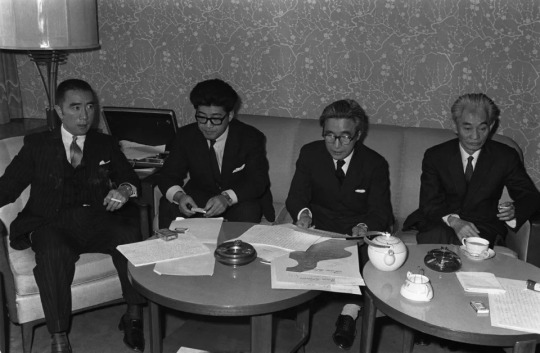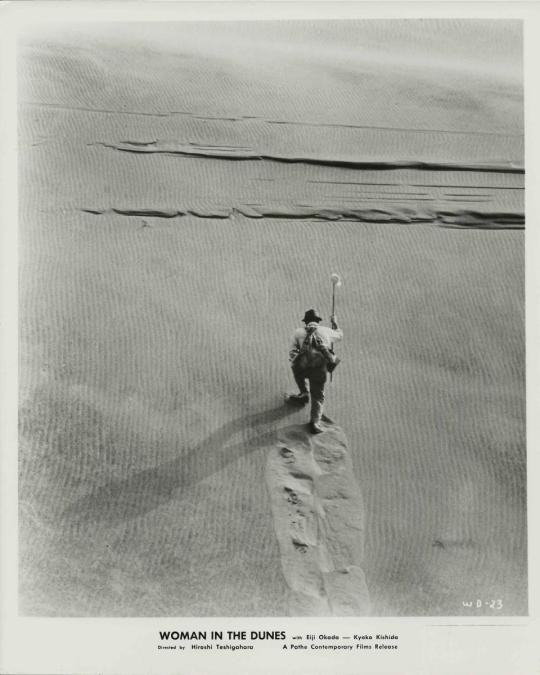#Kobo Abe
Explore tagged Tumblr posts
Text

安部公房展――21世紀文学の基軸
2024
118 notes
·
View notes
Text


他人の顔 / The Face of Another (1966) dir. Hiroshi Teshigahara
#cinema#cinematography#movies#horror movie#under the shadow#film#movie#cinepolis#kobo abe#the face of another#quote#noir#black and white
30 notes
·
View notes
Text











The Face of Another 1966 [他人の顔] - Hiroshi Teshigahara
No such thing as home, hence no dreams of escaping from it.
#movies#films#atmosphere#art film#letterboxd#obscure movies#drama#science fiction#the face of another#tatsuya nakadai#hiroshi teshigahara#japanese#japanese cinema#japan#kobo abe#1960s#old movies#cinema#movie stills#film screenshots#film stills#film screencaps#film score#the beauty of
33 notes
·
View notes
Text

Only a shipwrecked person who has just escaped drowning could understand the psychology of someone who breaks out in laughter just because he is able to breathe
Kōbō Abe, The Woman in the Dunes
106 notes
·
View notes
Text








14 notes
·
View notes
Text

Kōbō Abe (pen name of Kimifusa Abe (March 7, 1924), was a Japanese writer, playwright, musician, photographer, and inventor.
“The most frightening thing in the world is to discover the abnormal in that which is closest to us.”
Kobo Abe
#kobo abe#books#classic books#reading#books and reading#quotes#quote#inspiring quotes#life quotes#quoteoftheday#inspirational quotes#booklr#bookish#classic literature#literature quotes#bibliophile#books and libraries#lit#prose#spilled ink#book recommendations#literature#words#writers and poets#writing#birthday
23 notes
·
View notes
Text
To live is to fall into a pit
In a conversation with an American screenwriter, Ryu Murakami once said that all stories follow the same plot: the protagonist falls into a hole and either crawls out or dies within. When I heard that, it made sense to me; I could see nearly all stories fitting into that pattern. But in his genius, Abe would not settle for the ordinary. The Woman in the Dunes offers a third plot: the man finds a life inside the pit. Even in Alice’s Adventures in Wonderland, Alice’s experiences inside the rabbit hole work toward bringing her back to reality. Not so in The Woman in the Dunes. When the man is stranded at the bottom of the pit, he at first struggles to escape, but in the end, he chooses to remain there. When he finally obtains his much-longed-for means of escape, he has an epiphany and comes to understand the freedom to be found in staying inside the hole — a freedom that he chooses while letting a different freedom go. And that is what life is. Is that same third option not the framework that governs our society, our work, our families, our life, and our day-to-day life? Unknowingly, we all are lured into our pits, swallowed up, and we struggle to crawl out. But even if we make it out, nothing is changed. Outside, new holes are being dug; being trapped in a different pit is the only outcome. There are many such pits in life. Some are made for us, and others we make particularly for ourselves. For every pit trap, there is also a shelter. To live is to fall into many pits. As long as you are walking forward, you will fall into a pit. —Hideo Kojima, The Creative Gene (2010)
38 notes
·
View notes
Text

Artwork: 'Summer Night' by Kjell Nupen , 2009
* * * *
"Human time, you know, passes like a dream."
— Kobo Abe, from “Noah’s Ark,” Beyond the Curve: Stories (Kodansha, 1992)
[Belles-lettres]
35 notes
·
View notes
Text




OC HALLOWEEN 2024 → horror archetypes
bungou stray dogs ocs as horror archetypes
3 notes
·
View notes
Text
Because winds and water currents flow over the land, the formation of sand is unavoidable. As long as the winds blew, the rivers flowed, and the seas stirred, sand would be born grain by grain from the earth, and like a living being it would creep everywhere. The sands never rested. Gently but surely they invaded and destroyed the surface of the earth.
Kōbō Abe, The Woman in the Dunes
17 notes
·
View notes
Text

Writers Yukio Mishima, Kobo Abe, Jun Ishikawa, and Yasunari Kawabata reading the statement "Regarding the Cultural Revolution in China, it is imperative to preserve the self-discipline of learning and art" at a press conference. Photographed at the Hotel Imperial, Chiyoda-ku, Tokyo, 28 February 1967.
#yukio mishima#kobo abe#Yasunari Kawabata#Jun Ishikawa#三島由紀夫#安部公房#川端康成#石川淳#cultural revolution#chinese cultural revolution#1967
114 notes
·
View notes
Text

Alright. I took on trying to draw someone else's OC and I'm not sure about it.
This OC belongs to @bloominghydrangeas25
4 notes
·
View notes
Text

This book was written in the 60s and I just had an "Apollo and the gift of prophecy" kinda moment reading this
"If covering our bodies with clothes represents a cultural step forward, there is no guarantee that in the future masks will not be taken equally for granted [...] I wonder if a mask, being universal, enhances our relations with others more than does the naked face."
Like. Seeing someone wonder if there will be a time in the future when it'll be seen as normal for everyone to be wearing masks. I wonder. If that could happen. Hope it's not for an awful reason like a global pandemic
2 notes
·
View notes
Text

"Kangaroo Notebook" by Kobo Abe by @go_odbreakfast
- Radish sprouts.
- It can't be...
- I'm not kidding, I'll show you.
3 notes
·
View notes
Text
Recently Viewed: The Box Man
[The following review contains MINOR SPOILERS; YOU HAVE BEEN WARNED.]
The Box Man is based on a Kobo Abe novel that is—according to my admittedly limited research, at least—widely considered to be impossible to adapt. Although I am unable to properly judge the accuracy of that assertion (having not read the source material—yet), evidence in the film certainly supports it. The narrative is rough and ragged around the edges, so sprawling that it frequently threatens to unravel. As you might expect from a medium that requires concrete imagery, metaphor is often smothered by literalism. The tone and style are likewise wildly inconsistent—pulpy and avant-garde in equal measure; the iconography surrounding the eponymous hermit, for example, borrows much of its visual language from—of all genres—superhero cinema and anime.

The fact that director Gakuryu Ishii manages to wrangle the unwieldy story into something resembling coherence is nothing short of miraculous. A talented cast certainly helps matters: Masatoshi Nagase lends pathos and gravitas to even the most absurd scenes, while Tadanobu Asano (fresh off his acclaimed performance in FX’s Shogun) embraces the inherent slapstick comedy of the premise without hesitation or reservation. The poignant themes, too, anchor the chaotic plot; the recurring motif of false identities—a man who forsakes any semblance of “self” and instead lives as a nameless vagabond, a “doctor” that practices medicine without a license, a femme fatale whose allegiances and motivations remain infuriatingly ambiguous—is particularly compelling. The titular box emerges as a powerful symbol; clad in his cardboard armor, our protagonist exists on the fringes of a decaying society—anonymous, invisible, ignored by his so-called “civilized” fellow humans, trapped in their personal prisons of materialism and consumerism. But it’s the metafictional twist near the movie’s conclusion that truly elevates the whole package. I won’t spoil the ending here; suffice it to say that the audience is implicated as the ultimate voyeur, observing an artificial world through a narrow frame—judging the characters’ actions despite our fundamental lack of agency.
Featuring spectacularly choreographed fights, exquisitely overwrought melodrama, and inscrutably convoluted philosophy, The Box Man is the quintessential festival experience: impenetrably dense, difficult to classify or codify, a little pretentious, captivatingly beautiful, and absolutely unforgettable.
#The Box Man#Box Man#Kobo Abe#Gakuryu Ishii#Masatoshi Nagase#Tadanobu Asano#Japan Cuts#Japan Cuts 2024#Japan Society#Japanese cinema#Japanese film#film#writing#movie review
4 notes
·
View notes
